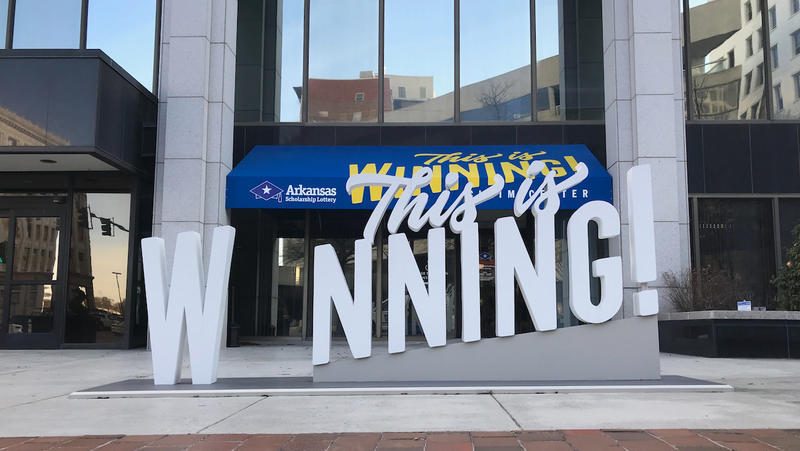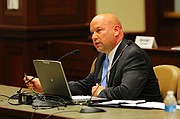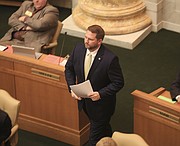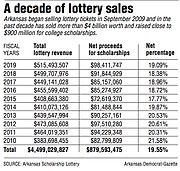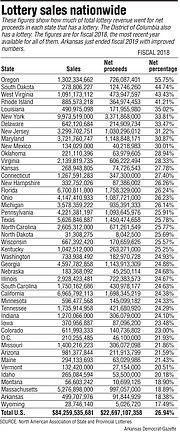College scholarships reaped about 19% of the Arkansas Scholarship Lottery's total revenue from ticket sales in the just-ended fiscal year that set records.
But a narrator in a video posted July 16 on the website of the Family Council -- a noted lottery foe -- says: "The fact that college students received so little money, despite the lottery setting records in revenue and ticket sales, speaks volumes about where the lottery's priorities really lie."
Since the Arkansas lottery started selling tickets on Sept. 28, 2009, the percentage of its revenue going for net proceeds has been among the lowest of lotteries across the nation.
For example, 18.38% of the Arkansas lottery's revenue in fiscal 2018 went to net proceeds, and that ranked next to last among the nation's 46 lotteries, behind only Wyoming's 17.49%, based on figures from the North American Association of State and Provincial Lotteries.
Arkansas' percentage improved to 19.09% in just-ended fiscal 2019. (Arkansas fiscal years end June 30.) The state sold $515 million worth of tickets and netted $98 million for scholarships in fiscal 2019. Both were records.
Altogether, 27% of the revenue of the 46 lotteries was distributed to net proceeds for a variety of beneficiaries, including schools and highways, in fiscal 2018.
During its first decade, Arkansas' lottery has sold $4.5 billion in tickets and raised almost $880 million for scholarships, according to state records, so nearly 20% of revenue financed college scholarships.
"Arkansas still ranks among the lowest as far as percent of return, but is likely in the middle or upper middle of the pack in per capita sales ($172 per cap) and profits per capita ($32.64), which is the most common measurement in the industry," lottery Director Bishop Woosley said in an email.
The most popular purchases are scratch-off tickets, he said.
"I would estimate most states are a 60/40 or 65/35 split in instant ticket sales versus draw game sales. We are an 80/20 split," he said in a written statement. "Our product mix is very instant ticket heavy like Massachusetts which has a return percentage of 19.38%."
Draw games include Mega Millions, Powerball, Natural State Jackpot, Cash 3, Cash 4, Fast Play and Lucky for Life.
The Arkansas lottery's profit margin on draw games was 33.9% and on instant tickets was 14.1% in fiscal 2019, said Woosley, who is now serving as the president of the North American Association of State and Provincial Lotteries.
The lottery has helped finance Arkansas Academic Challenge Scholarships for more than 30,000 students in each of the past nine fiscal years.
The total amount of the scholarships awarded peaked in fiscal 2012 at $132.9 million. The amount totaled $91.2 million in fiscal 2019. The Legislature has cut the size of scholarships three times, after more students than initially projected were awarded the monetary aid and net proceeds lagged initial projections.
CHANGES PROPOSED
In the past several years, Family Council officials have joined ranks with other lottery critics to push legislation they say would increase the amount raised for scholarships by requiring a higher percentage of revenue to be devoted to the financial assistance.
But state officials counter that the effect of these measures would require the agency to reduce the amount of prizes for players, which in turn would reduce the number of players, ticket sales and revenue -- and in the end, reduce the funds for scholarships.
These measures have failed to clear the Legislature in 2011, 2013, 2017 and 2019. No such measures were filed in the 2015 regular legislative session.
During this year's regular session, Rep. Jim Dotson, R-Bentonville, and Sen. Joyce Elliott, D-Little Rock, each filed similar bills to require the lottery's net proceeds to equal at least 20% of revenue in fiscal 2020. Under these bills, the required amount then would increase by 1 percentage point each subsequent fiscal year until it reached at least 25% in fiscal 2025.
But House Bill 1378 failed to clear the House Rules Committee, and Senate Bill 387 failed in the Senate Education Committee.
In February, Woosley told the House Rules Committee, "The moral of the story is we can have a percentage return.
"I can get you 21, 30, 35%, whatever you want, but it is going to be a much bigger piece of a much smaller pie, so we'll have 35% [of revenue going to scholarships], but it won't be $92 million," Woosley said. The lottery raised almost that amount in fiscal 2018.
"It will probably be about $50 million, and that's a reduction of about $40 million in scholarships," he said. "This bill would be a disaster for our lottery, and it would be immediate, and it would be irreparable."
But Dotson told the House Rules Committee, "I am not entirely convinced that the sky is going to fall and everyone is going to just stop playing because all of a sudden there is not as many options for instant-win games."
If revenue dropped to $235 million, "at 25% minimum [of revenue for scholarships], that would still provide $58 million a year in scholarships," Dotson said in February.
"I am not entirely convinced that those that play the lottery now will never play it again. However, if we do assume that they don't, that would be an extra $265 million in the pockets of poor Arkansans across the state. I think that is a win as well," Dotson said.
Dotson's bill failed to get a motion for approval from any member of the 20-member House Rules Committee, so it died, despite having 30 representatives as co-sponsors -- 21 Republicans and nine Democrats -- in the 100-member House.
Elliott's bill, co-sponsored by Sen. Mark Johnson, R-Little Rock, didn't clear the Senate Education Committee in March.
In earlier years, such legislative proposals sought a higher percentage for net proceeds, starting out at 35%.
Asked why the requested percentage has declined over the years, Ken Yang, director of governmental affairs for the Family Council, said, "We were initially trying to get as close to the national average.
"In the spirit of negotiating and with other neighboring states' percentage being at or around 25% we thought at the very least we should be at that percentage," Yang said in a written statement.
"Giving them 5 years to get to 25% was also done in the spirit of negotiation, but the answer has always been no with the lottery since they seem to be ok with being the worst or next to worst in proceeds given in the nation," he said.
ARKANSAS NUMBERS
The Arkansas lottery's scratch-off ticket revenue totaled $407.8 million in fiscal 2019, while draw-game revenue totaled $107.6 million, according to the lottery.
Thus, the scratch-off ticket revenue comprised 79.1% of the total ticket revenue of $515.5 million; draw-game revenue made up 20.9%, according to the lottery's report for fiscal 2019. (Other revenue includes $728,896 from fees paid by retailers.)
The majority of expenses are prizes. In fiscal 2019, scratch-off ticket prizes totaled $293.6 million and draw-game prizes totaled $56.2 million, the lottery reported.
Other major expenses included $29 million for retailer commissions; $23.6 million for gambling contracts; $7.3 million for marketing, advertising and promotions; $5.6 million for general and administrative expenses; and $4.9 million for employees' wages and benefits, according to the lottery.
Operating revenue totaled $516.2 million, while expenses totaled $421.3 million and interest income totaled $2.5 million to produce $98.4 million in net proceeds for college scholarships in fiscal 2019. The scholarships also are financed with $20 million a year of state general revenue and a $20 million reserve fund that covers temporary cash shortfalls regarding the payment of scholarships and the receipt of lottery proceeds.
The profit margin of 19.09% is based on net proceeds of $98.4 million and ticket sales of $515.5 million.
In March, Woosley told lawmakers that the lottery would probably net only about $55 million to $60 million for scholarships by fiscal 2025 if Elliott's bill became law.
Asked recently how he calculated that figure, Woosley said, "We know that if such a measure passed we would have to pull $20 and $10 instant tickets off the market immediately because of their payout.
"In addition, we would likely have to stop most of the Fast Play games due to their payout and modify our $5 instant ticket prize percentages to help us meet the 25% requirement," he said in a written statement. "My estimate was based on the elimination of those sales and accounting for a reduction in sales due to the $5 prize percentage drop. Over time, the reduction could be even more as people grow more and more disinterested in the lottery due to the lack of excitement and winning experience."
Woosley said the lottery has reduced personnel, contract prices and expenses "as much as possible."
The agency's number of employees has been reduced from a record high of 85 to 68, saving more than $1.1 million a year.
The contract with vendor Intralot has been reduced from an initial rate of 2.45% of sales to 2.11%, saving about $1.8 million in fees this year.
Closing claims centers saved about $400,000 a year, he said.
"As a result, for the lottery to increase its percentage return by 5-6%, we must take that from prizes," Woosley said. "The result would be that lottery sales would collapse and while percentage return may increase, the actual amount of cash to fund scholarships would decrease. That would be devastating to the lottery."
Dotson said he buys into the part of Woosley's argument that the number of players would be reduced if the most popular tickets were cut.
"Let's say he was half accurate, in whatever the numbers were. If he was about 50% accurate, [the lottery] would have the same amount of scholarships and fewer lottery ticket [sales]," he said.
In fiscal 2018, the lottery would have raised about $125 million for scholarships instead of $91.8 million based on revenue of about $500 million if it had been required to produce at least 25% of its revenue for scholarships, Dotson said.
In a fiscal year, the lottery could have sold $400 million in ticket sales and still raised about $100 million for scholarships under a 25% requirement, he said.
Elliott, who is co-chairwoman of the Legislative Council's lottery oversight subcommittee, said she doesn't entirely buy Woosley's argument either.
"It is not to say it is not without merit. So much of that is speculation, and so he is on the idea that this is the way we started and people can't change," she said.
2 NEIGHBORING STATES
In the fall of 2010, Ernie Passaliaigue, then the lottery director, pointed to Oklahoma to argue against requiring Arkansas' lottery to provide 35% of its ticket revenue in net proceeds. At that point, Oklahoma law required 35% of lottery revenue to go to schools.
During this year's Arkansas legislative session, Woosley pointed out that the Oklahoma Legislature in 2017 repealed that 35% requirement. Woosley has been lottery director since 2012.
Oklahoma's per-capita ticket sales average previously was $47 compared with Arkansas' average of $160, Woosley said recently in a written statement.
"Once the new games were launched, Oklahoma saw its instant ticket sales grow from $67.9 million to $127.6 million in the first year," he said. "Since that time, the amount returned for good causes has increased from $53 million to $67.6 million a year."
Rollo Redburn, who is the Oklahoma lottery's executive director, confirmed Woosley's figures on Friday.
Louisiana by law requires at least 35% of its lottery revenue to go to net proceeds.
Dotson noted that the Louisiana lottery transferred $177 million to education based on total revenue of $508 million in fiscal 2016.
Woosley told the House Rules Committee that Louisiana "is a little bit of an anomaly'" with its lottery drawing 65% of its revenue from draw games that are more profitable to lotteries than scratch-off tickets, while Arkansas' lottery draws about 80% of its revenue from scratch-off tickets.
In a report dated April 2 for the Louisiana Department of Economic Development, Spectrum Gaming Group of Horsham, Pa., said Louisiana's lottery is "underperforming to its potential due to the statutory requirement that it transfer at least 35% of gross revenue to the state. ... This mandate restricts the type of game and promotions the lottery may offer. The lottery industry is replete with examples of how higher payouts result in higher sales, which in return makes for greater return to the state."
Louisiana Lottery President Rose Hudson said Friday, "[W]e agree with the results and welcome the opportunity to speak with Louisiana's policymakers about continuing to fulfill our mission of maximizing revenue."
David Gale, executive director of the Ohio-based North American Association of State and Provincial Lotteries, said he doesn't believe one can compare state lottery net profits.
"It's like apples and oranges," he said, because the lotteries have operated for different time periods and because each has a different mix of products.
SundayMonday on 07/28/2019
